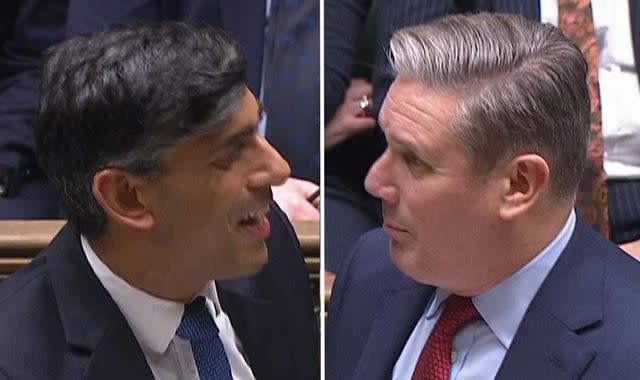The general election campaign has begun - as Rishi Sunak and Sir Keir Starmer focus on the economy

There may be months to go until the general election, but in both style and substance the long campaign has already begun - with both leaders zoning in on fruitful attack lines and ignoring inconvenient truths.
In his first Sunday morning interview of the year on Sky's Sunday Morning with Trevor Phillips, Sir Keir Starmer told Wilfred Frost the prime minister should set a date for the vote now and accused him of vainly waiting to clock up two years in Number 10 before calling an election.
A couple of miles across town, in another TV studio, Rishi Sunak seemed unable to make it more than a few minutes without uttering his rival's name and suggesting questions for his interviewer to put to the Labour leader.
As far as policy is concerned, the crossfire has centred on that traditionally decisive ballot box issue - the economy.
For Labour, a definite pivot is in motion on the party's 2021 conference pledge to spend £28bn a year on green investment.
The Tories have started vigorously targeting this expensive promise to try to turn it into an example of what they see as Labour profligacy.
Sir Keir said today if Rishi Sunak wanted a fight between "energy independence versus stagnation" then he should "bring it on".
It's a fact learned the hard way by many a party leader that the fight you want to have in an election campaign isn't always the fight you get.
That's probably why Sir Keir also tried to shift the emphasis from the precise figure to the broader promise of decarbonising electricity by 2030.
Many doubt either of these pledges can actually be met.
But for the Opposition, it's the big-ticket borrowing that risks the votes - so it's that which is being polished up into a more politically palatable offer.
There's a similar sense of reality denial around the discussion on tax.
Rishi Sunak gave his clearest indication yet that more tax cuts are on the way in the March budget with a further big offer to voters ahead of the election.
The price of government debt and levels of revenue being brought in by frozen allowances and thresholds mean this is probably feasible in the short term.
Read more:
Can the spring budget reverse Sunak's electoral fortunes?
PM accused of 'desperate' inheritance tax briefing
But the picture is more complicated if you look further ahead.
The prime minister says curbing benefit spending and making the state more efficient is the only way to sustainably cut the tax burden.
To start with, economists will point out that more expenditure in this area goes on benefits for households where someone works and on pensions.
But there are broader pressures too.
Given more money is set to go to areas like health, defence and education, overall spending levels for the years after the election look implausibly tight.
So much so that many conclude the long-term fiscal lookahead is quite simply a fiction designed to clear the way for pre-ballot tax giveaways.
Once again, the priority here appears to be votes.
The rest can be dealt with when the election is won - or, indeed, lost.

 Yahoo News
Yahoo News 
